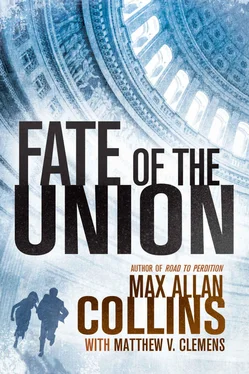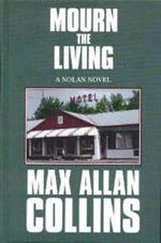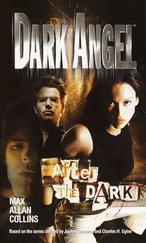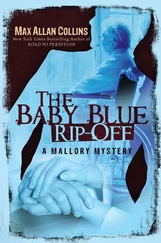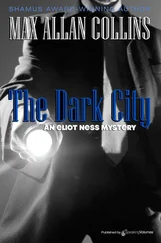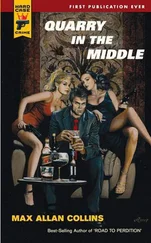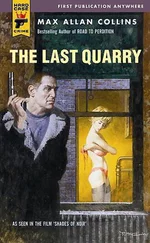“You mean, don’t drink the bourbon.”
His eyebrows rose and fell. “If those CSIs get here too soon, I might do that anyway.”
Reeder stepped back, tried to see the desk through his murdered friend’s eyes.
The surface was relatively sparse. No monitor — Chris used the missing laptop. A cup held some pens, an open space the likely laptop home, a mouse and mouse pad, a notepad, framed pictures of Beth and Christopher, Scotch tape dispenser, Post-it notes, glasses case. Normal stuff, the same things everybody else had on their desk.
“Have a look inside the mouse,” he said, “and look behind the photographs.”
She started on that while he picked up the glasses case.
“This might be it,” he said.
She glanced at him, curious.
“Chris has worn contacts for years,” he told her. “I don’t remember him ever to wear glasses.”
“Maybe they’re reading glasses.”
“I don’t think so. He wore graduated contacts. This would be a spare pair, for if he left his contacts in too long.”
She shrugged and began taking the picture frames apart.
Almost to himself, he said, “I don’t think Chris would leave his glasses case on top of his desk. It’d be tucked away in a drawer. Five bucks says there’s a flash drive in here.”
“You’re on.”
He opened the case and looked down at a pair of wire-frame glasses.
Rogers glanced over. “Glasses in a glasses case, huh? What will they think of next?”
“How long have we been here?”
“A good ten minutes. We’ll have company soon.”
“Shit.”
“I’m an old-fashioned girl. I’ll take the five in cash, or you can use PayPal, if dinosaurs know how to do that.”
He removed the glasses from the case, studied its plush cloth lining. Felt along the inside with his latex-covered fingers. A tiny rectangular lump in the liner.
He slowly peeled back the cloth to reveal a SIM card.
She was looking at it and then him with big eyes. “So you don’t owe me five dollars.”
“Digital photos,” he said, freeing the SIM card.
“But of what?”
“Let’s go find out.”
He was on his way when she was there beside him, touching his arm. “Joe, we’re taking this to Woods. Double-cross him now and later there’ll be hell to pay.”
He paused, then nodded.
Outside, they showed Woods their discovery.
He held out a hand, also gloved in latex. “I’ll take that, thank you.”
Reeder closed a fist over the SIM card. “Why don’t we all look at them together?”
Woods glared at him.
Reeder smiled sweetly. “You know — one big happy law enforcement family?”
“Somebody,” the young cop said, “should let some of that hot air out of you.”
“Now, Detective Woods,” Rogers said, “we’re operating on good faith. Your CSIs... where are they, by the way?... might or might not have found this. Also, we could have tucked that little gem away and walked out of here, taking along credit for ourselves and leaving any blame behind for you.”
Woods thought he was looking back at Rogers blankly, but Reeder read one micro-expression after another, starting with anger but winding up with apprehension.
Reeder said, his tone devoid of sarcasm, “Derailing a promising career, this early on, would be a damn shame.”
The CSI van was pulling in.
“Give me a few moments,” Woods said, and went to deal with the techs.
Reeder and Rogers returned to the front seat of her car and she got the motor and heater going again. A minute or so later, her cell rang.
She was talking to her computer guy and, from the start of the conversation, looked unhappy.
She was asking, “Is that even possible ?”
Her face tightened into a scowl as she listened, then she thanked Miggie, cursing as she clicked off.
She whirled to Reeder. “That photo ID?”
“Yeah?”
“Want to guess who Henry Patrick is?”
“No.”
“Patrick Henry.”
He frowned. “Either way it’s an alias.”
“That’s not what I mean. The photo is Patrick Henry.”
“A photo of Patrick Henry from the 1700s? Are Bill and Ted in it?”
The old film reference was lost on her, apparently.
She said, “Somebody took an oil painting image of Patrick Henry, changed the hair a little, and digitally tweaked the thing into looking like a photo.”
“That can be done?”
“I can’t do it, you can’t do it, but some people can, and Miggie says it’s not even that hard.”
She was shaking her head, but Reeder was thinking.
Finally he said, “Why Patrick Henry do you suppose?”
“Why not Patrick Henry?”
“It’s a lot of trouble to go to for an alias — I mean, it’s an FU joke, granted, but was it supposed to signify something? If anybody figured it out.”
She cocked her head. “Political maybe? Henry was the give-me-liberty-or-give-me-death revolutionary guy, right?”
“He was more than a revolutionary,” Reeder said. “Twice governor of Virginia. We’re in Virginia right now. Is it a state thing, then? Or a national thing? Some of what he said was considered outright treason — is this about somebody being a traitor? He was also a wealthy plantation owner — an anti-rich message? Something racial?”
“Or just,” she said, “a dumb joke. You might be overthinking it, Joe.”
“Maybe. But put your friend Miggie on it, anyway.”
“He’s probably already ahead of us, but I will.”
Fifteen minutes later, Reeder, Rogers, and Woods were seated in a corner booth at a Denny’s, having coffee. The Homicide man was using a tablet to run through the photos.
The detective found the file and they crowded around the screen looking at seven thumbnail photos.
“We’ll start at the top,” the detective said, clicking on the first photo.
They stared at a black plastic cube on a table. And it stared right back at them.
Rogers asked, “Anyone know what we’re looking at?” Reeder said, “Looks like a Rubik’s Cube in basic black.”
“A what?” Woods asked.
“Never mind. Suffice to say none of us know what that is or why Chris Bryson had a picture of it.”
Second photo.
Nondescript gray cement-block building with dirty windows, no signage. Parking lot in foreground, no cars.
“Anybody?” the detective asked.
Rogers said, “Just an anonymous building.”
Reeder, still studying the image, said, “So far, seems like random pictures.”
Third photo.
Well-dressed African American man in his thirties, formal-looking pose.
Reeder asked, “Could his name be ‘Sink’?”
“No,” Rogers said, sitting up. “That’s Michael Balsin, congressional aide. My team is investigating his murder.”
Woods perked. “Murder? When?”
“September. Two in the back of the head. No robbery, no clues, no apparent motive.”
Reeder met Rogers’s eyes with urgency. “What the hell is a vic of yours doing on Chris Bryson’s SIM card?”
“No idea... but it’s not like it’s a surveillance photo, which you might expect from an investigator like Bryson.” She nodded at the screen. “That’s the photo that ran with Balsin’s obit.”
Photo four.
Blond guy, blue eyes, double chin, dark-framed glasses.
“Pattern’s forming,” Rogers said, frowning. “That’s the obit picture for Harvey Carroll — an accountant. Our victim number two, double-tapped just like Balsin — in his home, no witnesses, no robbery.”
Reeder felt that familiar combination of excitement and unease — the former because a pattern was indeed forming, unease because a brutal killer or killers had been revealed.
Photo five.
Читать дальше
